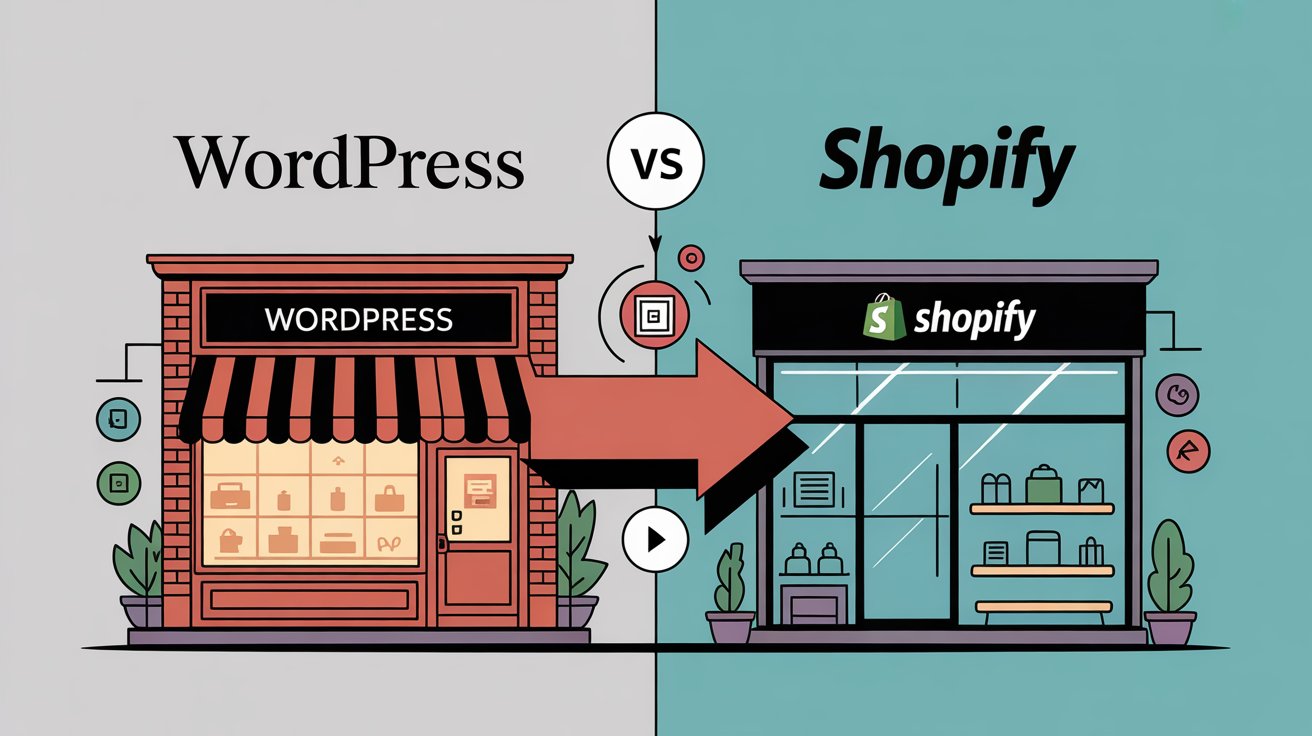Hey there, future online store owner! So, you’ve decided to dive into the exciting world of e-commerce—congratulations! But now comes the big question: WordPress or Shopify? Which platform is the perfect fit for your online store? Let’s break it down so you can make the best choice for your business.
1. Ease of Use
WordPress
- WordPress is incredibly flexible, but it comes with a steeper learning curve. You’ll need plugins like WooCommerce to transform it into an e-commerce store.
- It’s ideal for those who are comfortable with some technical setup or have access to a developer.
Shopify
- Shopify is the plug-and-play option. It’s designed specifically for e-commerce, making it super easy to set up and use, even if you’re a complete beginner.
- Everything from hosting to security is handled for you.
Winner: Shopify for simplicity, WordPress for flexibility.
2. Customization Options
WordPress
- With thousands of plugins and themes, WordPress gives you endless customization options.
- You have full control over the design and functionality of your store, but this can mean spending more time and effort.
Shopify
- Shopify offers a variety of themes and apps, but it’s not as customizable as WordPress.
- You can tweak your store’s look and feel, but deep customization often requires advanced coding skills or higher-tier plans.
Winner: WordPress for ultimate control, Shopify for quick and polished setups.
3. Cost
WordPress
- The WordPress platform itself is free, but you’ll pay for hosting, premium themes, plugins, and possibly developer costs.
- It’s more cost-effective if you’re willing to handle the technical side yourself.
Shopify
- Shopify’s pricing starts at $29/month, with additional costs for premium apps or themes.
- While it’s more expensive upfront, it includes hosting, security, and support, which simplifies management.
Winner: WordPress for budget-conscious users, Shopify for those seeking convenience.
4. SEO and Marketing
WordPress
- WordPress is an SEO powerhouse, especially with plugins like Yoast SEO or Rank Math.
- It gives you control over every aspect of your site’s optimization.
Shopify
- Shopify offers decent SEO features but lacks the depth of WordPress.
- However, it shines in built-in marketing tools like abandoned cart recovery and email campaigns.
My Opinion: If you’re planning to rely heavily on Meta Ads or quick promotions, Shopify is a fantastic choice. Its seamless integration with ad platforms and ease of tracking performance make it a marketer’s dream.
Winner: WordPress for advanced SEO, Shopify for integrated marketing.
5. Scalability
WordPress
- WordPress can handle growth, but scaling requires you to manage hosting upgrades and site performance optimizations.
- It’s perfect for those who want complete control over their scaling process.
Shopify
- Shopify is designed to grow with you. Its plans include features for larger stores, and you don’t have to worry about technical scalability.
Winner: Shopify for hands-off scalability, WordPress for hands-on control.
6. Support
WordPress
- With WordPress, you’re on your own unless you hire a developer. However, there are countless forums and communities to help.
Shopify
- Shopify offers 24/7 customer support, making it easier to resolve issues quickly.
Winner: Shopify for direct support, WordPress for a wealth of community resources.
Final Verdict: Which One is Right for You?
Choosing between WordPress and Shopify boils down to your needs:
- Go with WordPress if you want total control, extensive customization, and advanced SEO capabilities—and you’re comfortable with a bit of technical work.
- Choose Shopify if you’re looking for simplicity, all-in-one solutions, and fast setup with built-in support.
My Advice: If speed, simplicity, and quick integration with Meta Ads are your priorities, Shopify is the way to go. It’s perfect for building a fast and reliable store that connects seamlessly with ad platforms. On the other hand, if you love tweaking every detail and building a fully tailored experience, WordPress is your playground.
So, what’s it going to be? Whichever platform you choose, remember this: The success of your e-commerce store depends on how well you use the tools, not just the tools themselves. Good luck building your dream store!
Contact Us
Grow Digitals : https://growdigitalss.com/contact-us/
our Instagram : https://www.instagram.com/grow.digitals/


